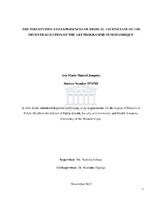| dc.contributor.advisor | Schaay, Nichola | |
| dc.contributor.advisor | Dgedge, Martinho | |
| dc.contributor.author | Joaquim, Ana Maria Manuel | |
| dc.date.accessioned | 2015-04-07T09:22:03Z | |
| dc.date.available | 2015-04-07T09:22:03Z | |
| dc.date.issued | 2012 | |
| dc.identifier.uri | http://hdl.handle.net/11394/4044 | |
| dc.description | Magister Public Health - MPH | en_US |
| dc.description.abstract | In response to the increasing burden with regard to treatment of HIV/AIDS in Mozambique, the Ministry of Health has developed a national strategic plan for HIV and AIDS. This provided for broader access to Antiretroviral Therapy (ART) by decentralizing and integrating ART services into the essential services provided at the primary care level. In keeping with this initiative,medical technicians are now responsible for first-line ART prescription and management at primary-level care health centres in the country. The ART programme was introduced in Mozambique in 2003 alongside other health services offered in hospitals; it was decentralized to
PHC health centres in 2006.This study aimed to explore the experiences and perceptions of medical technicians regarding the decentralization and integration of ART services into PHC health centres in Beira. An exploratory qualitative study was conducted using in-depth interviews, key informant interviews and focus group discussions. A sample of 15 medical technicians was distributed across two
focus groups for the purpose of discussion. In addition there were four in-depth individual follow-up interviews with four medical technicians, drawn from the two focus groups. Three key informant interviews were also held to collect data. The data was analysed using content analysis.The study revealed that the decentralization process was viewed by many of the medical technicians as a very positive initiative for the country. However a number of operational and managerial issues need to be addressed to ensure the effectiveness of the comprehensive
approach that was institutionalized and adopted by all PHC health centres. Key amongst the issues that needed to be addressed were the workloads of the health care personnel, and of medical technicians in particular. Their workloads have increased without any corresponding increase in the health workforce needed to manage the patient load. The medical technicians felt that this adversely affected the quality of care they were able to provide to patients, and specifically to those requiring ART medication. The recommendations that emerge from the
study are intended to promote the development of policy that will improve of working conditions and assist medical technicians to provide a better service to their patients. | en_US |
| dc.language.iso | en | en_US |
| dc.publisher | University of the Western Cape | en_US |
| dc.subject | HIV/AIDS | en_US |
| dc.subject | ART | en_US |
| dc.subject | Decentralization | en_US |
| dc.subject | Public sector health services | en_US |
| dc.subject | Health Workers | en_US |
| dc.subject | Medical Technicians | en_US |
| dc.subject | Workload | en_US |
| dc.subject | Job Satisfaction | en_US |
| dc.subject | Human Resources for Health | en_US |
| dc.subject | Mozambique | en_US |
| dc.title | The perceptions and experiences of medical technicians of the decentralization of the art programme in Mozambique | en_US |
| dc.type | Thesis | en_US |
| dc.rights.holder | University of the Western Cape | en_US |

